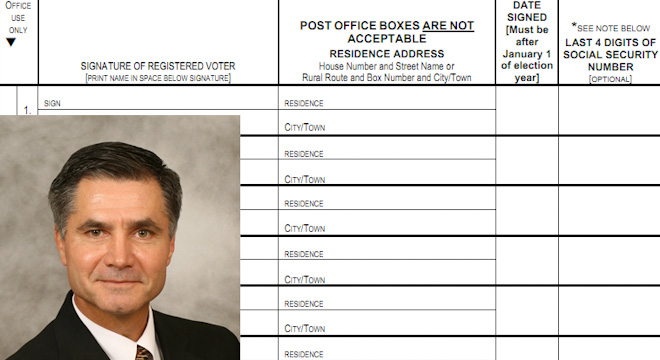All Michael Osborne wants is a little fairness. But in the end he may be responsible for handing Virginia’s Republican presidential delegates to someone other than who the polls show Virginia Republicans want.
In the long history of electoral embarrassments, a candidate failing to make the ballot in the state where he resides (and then calling that failure his campaign’s Pearl Harbor) puts Newt Gingrich near the top of the list. So it’s maybe not a surprise that some conservatives are questioning why Gingrich (and Rick Perry) didn’t make the ballot this time around when every Tom, Dick and Fred Thompson running in 2008 got their names on the Republican primary ballot.
Surely the rules were changed to make life tougher for Gingrich (and easier for establishment choice Mitt Romney), some have suggested.
This is where Osborne — Oz or Ozzie to his friends — comes in. The self-proclaimed conservative independent and former Republican leans any which way but Romney in the Republican presidential primary fight, and says he likes what Gingrich has to say. But thanks to a lawsuit he filed after his local GOP, he says, tried to keep him off the ballot earlier this year as their nominee in a southwest Virginia delegate race, Osborne may be partially responsible for Romney’s much smoother path toward a win in the Commonwealth on Super Tuesday.
Ballot access expert Richard Winger first reported Osborne’s story Monday. In order to understand it, you need to understand how candidates are chosen for the ballot in Virginia — namely, by collecting thousands of signatures. If a candidate runs for a slot on a party ballot (e.g. as a Republican or a Democrat), party officials are responsible for verifying the validity of the signatures, which have to meet a number of criteria. If a candidate runs as an independent, the State Board of Elections verifies the signatures.
As Winger reports, up until this year the state GOP did not verify the signatures with the diligence that you might expect. “[I]n the only other presidential primaries in which Virginia required 10,000 signatures (2000, 2004, and 2008) the signatures were not checked,” Winger writes. “Any candidate who submitted at least 10,000 raw signatures was put on the ballot.”
Put another way, Winger says Republican officials used to essentially ignore the legal requirement that signatures be verified, accepting raw signatures instead. But this year, things were different. The state GOP gave the list of signatures a close look, Winger says, which is why Gingrich and Perry (who both professed to turn in more than 10,000 signatures) didn’t make it.
Osborne ran as an independent after he says the Republicans denied him a shot at the GOP ballot line. Then he filed a lawsuit against his local GOP in October, claiming it was unfair that he had to have his signatures verified by the state while his GOP opponent only had to get the sign off from the Republican Party. The legal action is still underway, but Winger wrote the suit led the state GOP to switch up its verification procedures (or, put a different way, start having some.)
“I thought that might have something to do with it,” Osborne said Monday when told about the speculation his lawsuit helped set the table for Gingrich’s failure. Osbourne said he likes a number of candidates who won’t appear on the presidential ballot in Virginia (he mentioned Michele Bachmann, Rick Santorum as well a Gingrich) along with one who will: Ron Paul.
I asked him if he feels responsible for Gingrich staying off the ballot in a state where a recent poll showed him with a sizable lead in the primary.
“If I do [have anything to do with it] I’m happy,” Osborne said. “He needs to follow the law and I’m sure what happened is in the past is they probably gave it a wink and a nod.”
While Osborne suggested something might be afoot — “maybe the Republican Party used my lawsuit as a convenient excuse to change the rules,” he said — he was adamant that the only person who deserves credit for Gingrich’s Virginia mess is Gingrich.
“I blame Gingrich,” he said. “The law’s very clear. If he didn’t get the signatures and other people did…the law’s the law and it should be fairly applied to everybody.”









